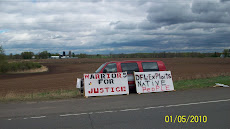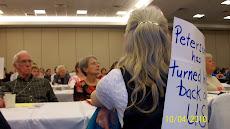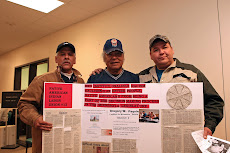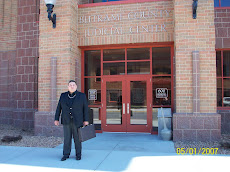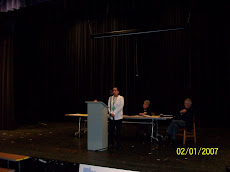Published November 01 2009
Lawsuit alleges racism in BREC hiring
The city didn’t follow affirmative action laws in hiring workers for the Bemidji Regional Event Center, alleges a civil lawsuit filed a week ago in Beltrami County District Court.
By: Brad Swenson, Bemidji Pioneer
The city didn’t follow affirmative action laws in hiring workers for the Bemidji Regional Event Center, alleges a civil lawsuit filed a week ago in Beltrami County District Court.
Also named in the lawsuit are the state Department of Employment and Economic Development, which administers the state bonding grant for BREC construction, and Kraus-Anderson Construction Co., BREC construction manager.
Filing the lawsuit is Greg Paquin of Bemidji, business manager for the Native American Labor Union No. 12, and a declared Democratic candidate for Minnesota Senate 4.
The suit alleges that the defendants “acted with intent and forethought to engage in racist hiring practices as part of a clear pattern intending to maintain the well established institutionalized racism to deny and deprive native Americans construction employment in the construction of the Bemidji Regional Event Center,” Paquin said Saturday in a statement.
BREC “is a public works program funded with taxpayer dollars and publicly backed bonds,” he said, adding that the defendants were “in complete and total disregard for affirmative action guidelines and legislation (that each) were individually and collectively aware of but chose to ignore.”
“We feel it’s a frivolous lawsuit,” Bemidji City Manager John Chattin said Saturday. “We’ve just got a copy of the filing … which has been turned over to the League of Minnesota Cities. The League will be handling it.”
In the court complaint, Paquin said he requested from the city and construction manager copies of affirmative action guidelines but received none. He said Kraus Anderson requested that six American Indian names be submitted informally and that the company representative “would see what he could do.”
Seven names were submitted to BREC contractors and “to this date I have not heard from one contractor or entity involved in this BREC project,” the complaint states. “We have been denied participation, denying our civil rights to be employed on this state-funded project.”
City Attorney Al Felix confirmed that the lawsuit has been turned over to the League of Minnesota Cities, which assigned the Twin Cities law firm of Kennedy & Graven to defend the city.
Felix, in a telephone interview Saturday evening, said the lawsuit is vague “but seems to be aiming at affirmative action, saying that there’s somehow affirmative action quotas … or guidelines that somehow the city’s not following.”
He agrees with Chattin the lawsuit is frivolous “because we can’t obviously make out what he’s (Paquin) getting at or what he’s pointing to.”
While Paquin cites several state statutes, Felix said there is no affirmation action requirements for BREC construction, only that there not be discriminatory hiring practices. Only projects with federal monies usually have minority hiring written into the contract, he added.
“He throws the kitchen sink in at it in terms of citings,” said Felix. “But in terms of specifics, there aren’t any specifics. And there are not specific guidelines, if you will, or particular hiring quotas or percentages or anything like that as you might see … with a federal contract.”
Federal contracts may specify a certain percentage of minority businesses or women-owned businesses, “but we don’t have that requirement here,” Felix said. “We don’t have any federal money involved in the BREC project.”
As part of a larger issue, Paquin said that “at the center … is the blatant racist hiring practices of private employers and county, state and federal governmental units and agencies who often, as in the case of the Bemidji Regional Event Center, work together in collusion to maintain the pattern of institutionalized racism which is responsible for the high unemployment rate among native Americans on and off the Indian reservations which breeds extreme poverty with its associated deplorable living conditions of poor, substandard and inadequate housing; inadequate and underfunded public schools; drug, alcohol and sexual abuse; poor health and lack of adequate health care; child malnutrition and improper diets; inadequate transportation services.”
Paquin notes that “affirmative action guidelines are clearly articulated by state and federal guidelines, rules and statutes which local governments and private contractors are aware and mandated to follow and enforce …”
The city in constructing the BREC need only follow state law on discriminatory hiring practices, Felix maintains.
“We obviously have requirements not to discriminate and we have all that in our agreements,” Felix said. “We have complied with all the laws we have to comply with. … I don’t think there’s any merit to his claims, but I’m not defending the lawsuit.”
Attorneys representing the city and the state have been appointed, he added. “This will just have to play out.”
In his statement, Paquin said he is asking that half the jobs on the BREC, from management on down, be designated for American Indians.
The court complaint cites “the discovery of damages to the Native American Indian Labor Union No. 12 and those denied opportunity on this project in punitive and compensatory damages regarding the manner represented in DEED-funded projects that fail to meet the affirmative action guidelines, goals and objectives.”
The Native American Indian Labor Union No. 12, founded by Paquin, is not recognized by the AFL-CIO.
